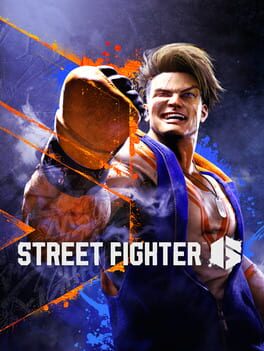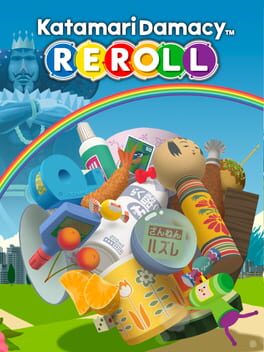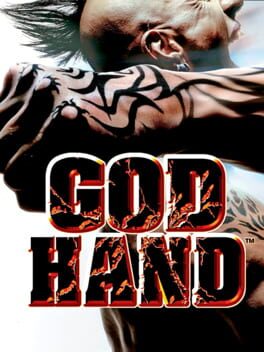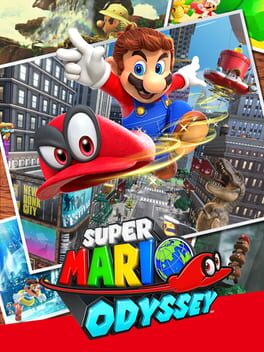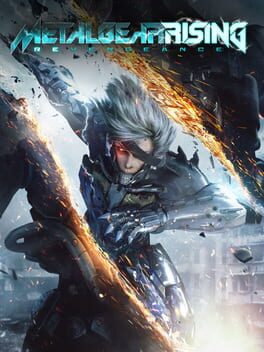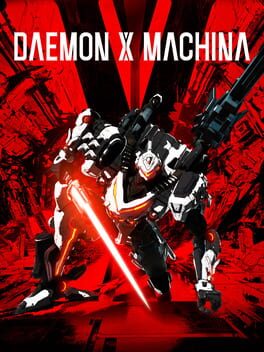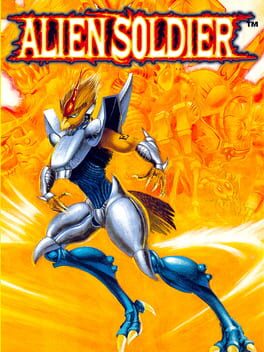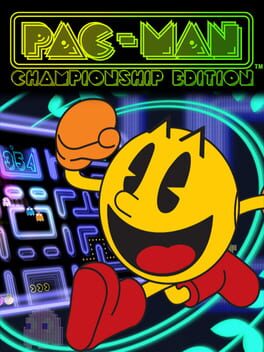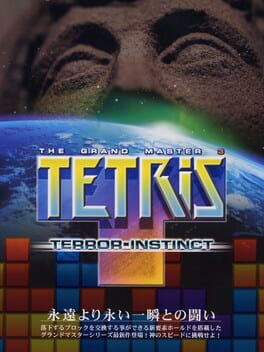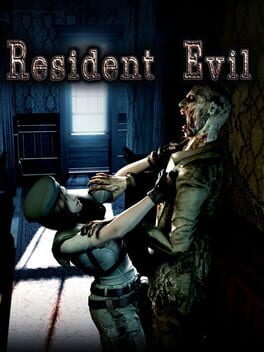LukeGirard
BACKER
362 Reviews liked by LukeGirard
Street Fighter 6
2023
overbrightened the visuals, and has tacky gradient lighting in spots. the original ps2 version has a great muted-yet-colorful look going on with all of its soft mid-tones. i also hate the weird revisionist-history mascotified redesign of the prince that has bled over to merch. its a shame that this is the only rerelease of this game--and i'm surprised no one has done a "original game restoration mod" in the same way that sonic adventure 1 and 2 have
God Hand
2006
Metroid Dread
2021
Super Mario Odyssey
2017
Daemon X Machina
2019
Vampire Survivors
2021
Alien Soldier
1995
Alien Soldier is the very definition of Sink Or Swim. It doesn't care who you are or where you came from, you're not going ANYWHERE until you blast this massive, writhing, cybernetic worm thing all the way to Hell. If Shadow of the Colossus can be called a “Boss Rush,” then Alien Soldier is a “Boss Stampede.” A “Boss Bullet Train.” A “Hyper Boss Fighter II Turbo: Fight for the Future.“ Why nobody’s been hollering loudly about Alien Soldier’s greatness for the last two decades is seriously beyond me, though it’s probably because they’re all too busy evangelizing Gunstar Heroes (or — checks notes — Minecraft). Then again, as of my writing this, Alien Soldier already has a higher average rating than Gunstar Heroes on Backloggd.com, though, let’s pretend I’m not preaching to the choir for just a moment.
Somewhere between Treasure’s previous run-and-gun ventures and Sin and Punishment, Alien Soldier achieves actual, No-Really relentlessness. Barreling through setpiece after setpiece, packed with wild battles so frantic that your real-world cool-headedness becomes an active game mechanic, its manufactured setting takes on an air of genuine ferocity. It’s so videogame-y that, in the heat of the moment, its game-y-ness folds back on itself and becomes believability. The drama that emerges from its extreme white-knuckle “VISUALSHOCK!!” action grinds the nonsense story on the title screen down to powder. Rather than getting kicked back to a level select, you progress until you win or die. And “winning” puts every twitch action reflex bone in your body to the test.
Remember how, right at the start, Gunstar Heroes made you choose whether or not you’d be able to move while shooting for the whole game? Alien Soldier laughs directly into the camera, says “THAT was dumb,” reels back, and hurls the car keys your way at mach five. It’s your responsibility to work out When to do What. Select any four of six possible weapons to cycle between. Press the jump button in mid-air to hover in place. You can walk on the ceiling. Parry bullets to turn them into health blobs. Reach max health, and your invulnerable dash becomes a Fiery Death Charge. Because this is a certifiably Great Videogame, this damages you slightly. Here, the rhythm of Alien Soldier’s dance comes into focus. Swap modes, cycle weapons, fire, dodge, cycle again, hover, parry bullets, dash, and you might just live to fight the next unholy abomination. You can breathe when it’s over.
It’s a dollar on Steam.
Somewhere between Treasure’s previous run-and-gun ventures and Sin and Punishment, Alien Soldier achieves actual, No-Really relentlessness. Barreling through setpiece after setpiece, packed with wild battles so frantic that your real-world cool-headedness becomes an active game mechanic, its manufactured setting takes on an air of genuine ferocity. It’s so videogame-y that, in the heat of the moment, its game-y-ness folds back on itself and becomes believability. The drama that emerges from its extreme white-knuckle “VISUALSHOCK!!” action grinds the nonsense story on the title screen down to powder. Rather than getting kicked back to a level select, you progress until you win or die. And “winning” puts every twitch action reflex bone in your body to the test.
Remember how, right at the start, Gunstar Heroes made you choose whether or not you’d be able to move while shooting for the whole game? Alien Soldier laughs directly into the camera, says “THAT was dumb,” reels back, and hurls the car keys your way at mach five. It’s your responsibility to work out When to do What. Select any four of six possible weapons to cycle between. Press the jump button in mid-air to hover in place. You can walk on the ceiling. Parry bullets to turn them into health blobs. Reach max health, and your invulnerable dash becomes a Fiery Death Charge. Because this is a certifiably Great Videogame, this damages you slightly. Here, the rhythm of Alien Soldier’s dance comes into focus. Swap modes, cycle weapons, fire, dodge, cycle again, hover, parry bullets, dash, and you might just live to fight the next unholy abomination. You can breathe when it’s over.
It’s a dollar on Steam.
Packs more thrills, spills, heartbreak and meaningful decision-making into five minutes than some games ever manage in fifty hours. Pac-Man Championship Edition is the smallest number of parts milked for maximum engagement, bringing out the best of the original while deftly dodging its googly-eyed ghost with newfound finesse. Threading through its shifting labyrinth, taking in the positions of dots and fruit and the movement patterns of each brightly-colored pursuer at all ends of the screen, one can’t help thinking that its titular “Championship” might be of a more cosmic variety…one which begins and ends…with Pac-Man.
Resident Evil 4
2005
The first issue of Nintendo Power that I ever read (#231) included a segment titled “BEST OF THE BEST,” where Chris Slate and the gang ranked what they considered the twenty greatest games for every Nintendo console. As an eight year-old sitting in a seven-week summer camp where videogames were absolutely off-limits, this was a treasure trove. So much had already stoked my curiosity for my pastime’s past, Nintendo’s in particular, and this magazine was a whole gallon of kerosene on that tiny lil’ flickering spark. It’s here that the seeds of intrigue for the Legend of Zelda series were first planted in my brain, seeing as it always seemed to narrowly edge out the guy I was there to see (up until the dedicated Wii page, where Mario Galaxy reigned supreme), but in the small collection of those that stood up there with the Big Boys was a glaring anomaly. The GameCube was my introduction to the medium, emblematic of Mario Kart and Sonic Adventure, but here, it was host to the grungiest entry on the entire list. Scary, even, for a kid as timid as I was. That fiery screenshot, with its grotesque giant towering over a gun-toting action hero, branded itself onto the grooves of my gray matter. And right beneath it —
01 – RESIDENT EVIL 4
Somehow, the whimsy and imagination I so craved had lost out to the brutish violence I'd glimpsed in more “MATURE” content, and on its home turf, too…I might’ve been a bit put-off, but I had the whole rest of the summer to think it over. I knew that if even the staff of Nintendo Power had to hand the cup to Capcom (themselves acknowledging how rare it was for a “third-party game to top Nintendo on its own system”), there must’ve been something to it.
Fast-forward another fourteen years, and Resident Evil 4’s reputation has become impossible to ignore. Its third-person shooting is so legendarily perfect that it “killed” its own series, cutting off any and all future for fixed camera angles, but also never quite being succeeded by anything that managed to improve on its gameplay. There’s even been some renewed vitriol levied against RE4 in recent years now that the series has managed to finally recapture some amount of its success with something closer to an A-Horror aesthetic (at least among fans I know), but either way, the conversation has never seemed able to escape from the devouring whirlpool of that fourth entry. I still hadn’t gotten around to any of ‘em myself, having decided I wasn’t a horror guy or a shooting guy for most of my life, but that was changing as I was gradually broadening the scope of my personal taste. Eventually I figured that, if I was ever gonna get around to Resident Evil, I’d be one of those diehard fixed camera haunted house puzzle box fiends, decrying 4’s abandonment of all that is subtle, terrifying, and holy. It was too colorless, too vapid to catch the interest of one with taste as REFINED as myself. Right. As if.
No, I’m not too good for Resident Evil 4. Not even close, and I knew it within the first fifteen minutes. It takes no time at all before we’re fending off crowds of parasite-infected villagers as the most adorkable government operative this side of Solid Snake, and if the goofy “rEsiDeNt eeEEviLLL…fOOOUUuurRRR” on the title screen didn’t gear me up for a schlock-fest, Leon’s indelible “bingo” quip did the trick. Even as an MGS fan, I don’t know if I’d have guessed how well that balance between the tense, sometimes genuinely fear-inducing gameplay and the campy fun of the story would work for me. Metal Gear’s cartoonish stealth often straddles the same line between silly and serious as its cutscenes, but the shamelessly corny character interactions here were a relief, a chance to laugh before plunging back into atmospheric danger, and that made it much more endearing than I’d expected. I understand the pushback against some of the nonsense here, especially with such a strong opening area, but it was just too entertaining to ever strike me as some kind of tragic missed opportunity. I never thought I’d enjoy quicktime events, and escort missions are rarely done well, but the occasional button-mash and the presence of a companion both counterbalance the thrilling dread of the regular gameplay in all of the right ways (and RE4’s gameplay somehow manages to measure and expand on both ideas).
Despite the recent ubiquity of the genre, I hadn’t actually played a dedicated third-person shooter before this game (so my bewilderment over its greatness is probably not that far off from players of its day), but my impression of the sixth console generation had always been, when it came to the big names, an eschewing of tightness and gameplay depth in favor of breadth and spectacle. I was more wrong than I realized. Resident Evil 4 is almost, if not as dedicated to its core hook as the original Super Mario Bros., and its ability to take a minimalistic and intuitive system and spin it out into dozens of dynamic situations is about as well-documented too. The temptation to build a game around a narrative concept or theme can be strong, but RE4 is a textbook example of what happens when a designer picks one verb and rolls with it all the way, come hell or high water. You don’t need me rattling off every little nuance, but its handling of the interplay between ranged and melee combat is so sick that, even without a plot, the promise of getting to set up and execute the next head-smashing suplex would’ve been enough to carry me through the entire game both times.
Slim resources are a fine way to get the player to pick their shots carefully, but this added layer means they’re also weighing where and when to aim to get the most out of every bullet. Headshots open the door to sweeping roundhouse kicks which can topple an entire tide of lurching foes, but, unless I could afford to spend some shotgun ammo, I never wanted to be too close to the horde while I was at it. I found myself sizing up a situation, firing off some careful headshots from afar, and then closing the distance to cash in on that splash damage. Shooting below the knees is best when looking to take out an individual enemy with a spectacular skull slam. That simple decision makes it so much more than your typical “glory kill,” it always rewards the player for thinking several steps ahead. ‘Course, you’ve got more on hand than just a couple of guns and Leon’s ridiculous muscles, and RE4 rarely disappoints the desire to use the environment in creative ways. In one of the best moments in either of my playthroughs, I threw down a flash grenade while surrounded by goons, and quickly took advantage of the resulting stun effect to kick all of them, one by one, down a hole in the center of the room. Unless any other third-person shooter can offer anything nearly that good, I'm afraid I’ll have to kindly ask the genre to sit down. This game goes in so many directions with its core mechanics that I don’t even feel much of a need to play any of its successors, spiritual or otherwise.
If there is a downside to that insatiable exploration of concepts, though, it’s that it reveals just how narrow the range of RE4’s excellence really is. Its pacing is just about perfect almost all the way through, dialing the intensity up and down with tremendous care and drawing from a seemingly endless barrel of ideas (it can’t be understated that just about every encounter features a distinct spin of its own that makes the engagement unique), but somehow, it didn’t quite manage to wow me in the end. I’m talking about the very end here, just the final few setpieces. Maybe capping off such a crowd-focused game system on a more traditional one v. one final boss fight wasn’t quite the right move, perhaps the insanity of that second to last segment was just a little too messy (despite being succeeded by a pretty great little zone), maybe the game had already hit such a spiraling high just a little earlier that the final stretch couldn’t possibly have lived up, or maybe it really did need a bit more weight to its drama to make that ending sing. Whatever the reason, it’s hard to criticize RE4 for failing to “stick to its guns” when it does so fantastically over the course of the whole game, but it clearly does best in those explorable combat arenas, filled with ins and outs and enemy types to strategize around. When the conclusion finally did roll in, it seemed to have already exhausted just about every possible configuration of those parts it could dream up, but it’s a good thing it ends only a little after it stops playing to those very particular strengths. Surprised as eight year-old me might’ve been to hear this coming from himself, that just makes it all the more enticing to hop back over to the start and climb Resident Evil 4’s rollicking “Tower of Terror” over again.
I guess Chris Slate was just me all along...
01 – RESIDENT EVIL 4
Somehow, the whimsy and imagination I so craved had lost out to the brutish violence I'd glimpsed in more “MATURE” content, and on its home turf, too…I might’ve been a bit put-off, but I had the whole rest of the summer to think it over. I knew that if even the staff of Nintendo Power had to hand the cup to Capcom (themselves acknowledging how rare it was for a “third-party game to top Nintendo on its own system”), there must’ve been something to it.
Fast-forward another fourteen years, and Resident Evil 4’s reputation has become impossible to ignore. Its third-person shooting is so legendarily perfect that it “killed” its own series, cutting off any and all future for fixed camera angles, but also never quite being succeeded by anything that managed to improve on its gameplay. There’s even been some renewed vitriol levied against RE4 in recent years now that the series has managed to finally recapture some amount of its success with something closer to an A-Horror aesthetic (at least among fans I know), but either way, the conversation has never seemed able to escape from the devouring whirlpool of that fourth entry. I still hadn’t gotten around to any of ‘em myself, having decided I wasn’t a horror guy or a shooting guy for most of my life, but that was changing as I was gradually broadening the scope of my personal taste. Eventually I figured that, if I was ever gonna get around to Resident Evil, I’d be one of those diehard fixed camera haunted house puzzle box fiends, decrying 4’s abandonment of all that is subtle, terrifying, and holy. It was too colorless, too vapid to catch the interest of one with taste as REFINED as myself. Right. As if.
No, I’m not too good for Resident Evil 4. Not even close, and I knew it within the first fifteen minutes. It takes no time at all before we’re fending off crowds of parasite-infected villagers as the most adorkable government operative this side of Solid Snake, and if the goofy “rEsiDeNt eeEEviLLL…fOOOUUuurRRR” on the title screen didn’t gear me up for a schlock-fest, Leon’s indelible “bingo” quip did the trick. Even as an MGS fan, I don’t know if I’d have guessed how well that balance between the tense, sometimes genuinely fear-inducing gameplay and the campy fun of the story would work for me. Metal Gear’s cartoonish stealth often straddles the same line between silly and serious as its cutscenes, but the shamelessly corny character interactions here were a relief, a chance to laugh before plunging back into atmospheric danger, and that made it much more endearing than I’d expected. I understand the pushback against some of the nonsense here, especially with such a strong opening area, but it was just too entertaining to ever strike me as some kind of tragic missed opportunity. I never thought I’d enjoy quicktime events, and escort missions are rarely done well, but the occasional button-mash and the presence of a companion both counterbalance the thrilling dread of the regular gameplay in all of the right ways (and RE4’s gameplay somehow manages to measure and expand on both ideas).
Despite the recent ubiquity of the genre, I hadn’t actually played a dedicated third-person shooter before this game (so my bewilderment over its greatness is probably not that far off from players of its day), but my impression of the sixth console generation had always been, when it came to the big names, an eschewing of tightness and gameplay depth in favor of breadth and spectacle. I was more wrong than I realized. Resident Evil 4 is almost, if not as dedicated to its core hook as the original Super Mario Bros., and its ability to take a minimalistic and intuitive system and spin it out into dozens of dynamic situations is about as well-documented too. The temptation to build a game around a narrative concept or theme can be strong, but RE4 is a textbook example of what happens when a designer picks one verb and rolls with it all the way, come hell or high water. You don’t need me rattling off every little nuance, but its handling of the interplay between ranged and melee combat is so sick that, even without a plot, the promise of getting to set up and execute the next head-smashing suplex would’ve been enough to carry me through the entire game both times.
Slim resources are a fine way to get the player to pick their shots carefully, but this added layer means they’re also weighing where and when to aim to get the most out of every bullet. Headshots open the door to sweeping roundhouse kicks which can topple an entire tide of lurching foes, but, unless I could afford to spend some shotgun ammo, I never wanted to be too close to the horde while I was at it. I found myself sizing up a situation, firing off some careful headshots from afar, and then closing the distance to cash in on that splash damage. Shooting below the knees is best when looking to take out an individual enemy with a spectacular skull slam. That simple decision makes it so much more than your typical “glory kill,” it always rewards the player for thinking several steps ahead. ‘Course, you’ve got more on hand than just a couple of guns and Leon’s ridiculous muscles, and RE4 rarely disappoints the desire to use the environment in creative ways. In one of the best moments in either of my playthroughs, I threw down a flash grenade while surrounded by goons, and quickly took advantage of the resulting stun effect to kick all of them, one by one, down a hole in the center of the room. Unless any other third-person shooter can offer anything nearly that good, I'm afraid I’ll have to kindly ask the genre to sit down. This game goes in so many directions with its core mechanics that I don’t even feel much of a need to play any of its successors, spiritual or otherwise.
If there is a downside to that insatiable exploration of concepts, though, it’s that it reveals just how narrow the range of RE4’s excellence really is. Its pacing is just about perfect almost all the way through, dialing the intensity up and down with tremendous care and drawing from a seemingly endless barrel of ideas (it can’t be understated that just about every encounter features a distinct spin of its own that makes the engagement unique), but somehow, it didn’t quite manage to wow me in the end. I’m talking about the very end here, just the final few setpieces. Maybe capping off such a crowd-focused game system on a more traditional one v. one final boss fight wasn’t quite the right move, perhaps the insanity of that second to last segment was just a little too messy (despite being succeeded by a pretty great little zone), maybe the game had already hit such a spiraling high just a little earlier that the final stretch couldn’t possibly have lived up, or maybe it really did need a bit more weight to its drama to make that ending sing. Whatever the reason, it’s hard to criticize RE4 for failing to “stick to its guns” when it does so fantastically over the course of the whole game, but it clearly does best in those explorable combat arenas, filled with ins and outs and enemy types to strategize around. When the conclusion finally did roll in, it seemed to have already exhausted just about every possible configuration of those parts it could dream up, but it’s a good thing it ends only a little after it stops playing to those very particular strengths. Surprised as eight year-old me might’ve been to hear this coming from himself, that just makes it all the more enticing to hop back over to the start and climb Resident Evil 4’s rollicking “Tower of Terror” over again.
I guess Chris Slate was just me all along...
This game fucking sucks and has ruined my life. This is why I have given it a 5, despite not reaching GM on master mode; I am a fake gamer after all. As for the other game modes, Shirase has taken 10 years off of my life and should never be a selectable game mode again, while Sakura just sits there as a puzzle game mode (and is pretty inoffensive, especially compared to Shirase). In conclusion, this is actually the best Tetris (Rez Tetris doesn't count) and I am so scarred mentally that when I close my eyes my mind wanders and I immediately start playing Tetris with my mind. I deserve lifetime pension for playing this.
Silent Hill
1999
(Note: The following is the blurb I wrote for Silent Hill as part of user Pangburn's epic "Sight and Sound Poll"-style project where he essentially established Backloggd's definitive canon. Can't say enough good things about that massive undertaking and the work he put in - and for making me write this. Despite SH being my own "canon" favorite game for, I don't know, fifteen years or something now, I've never written about it. I find it extremely difficult to articulate its qualities - which in my mental laziness I feel like should be totally self-evident - and it's effected me in such a strongly and weirdly personal way that I don't feel I have the vocabulary to describe it. But I do love it, and he knew that, and despite me initially demurring like a chickenshit, he got me to stand up and be counted for this absolutely beyond-godlike classic. So, since I don't know that I'll ever find my way to writing more about it outside of passionate defenses and references in random comments, I figured I should repurpose it here, for posterity. Anyway.)
Building further on the steady development of its progenitors SWEET HOME, ALONE IN THE DARK, and RESIDENT EVIL, Silent Hill expanded the scope of video game horror both outward and inward. Rather than a mansion or series of interconnected buildings, it gave players a sprawling, fully three-dimensional town full of terrors to explore, yet focused on assaulting them mainly with their own fear of the unknown, clouding the story, characters, monsters, and environments in metaphor and dream logic, keeping them submerged in an oppressive sense of dread that made opening any new door genuinely unnerving. The aesthetic - essentially unmatched on the PlayStation - married Japanese sensibilities with the nightmarish imagery of its developers' favorite western horror media, and created a dark and atmospheric, crisp yet deliberately obscured look and sound that threw the doors open wide for a whole subgenre of J-Horror games that would follow. Silent Hill's project and effect on the player can be understood through its most indelible image, one that continues to define scary video games to this day - a normal person alone on an abandoned city street, faced with an enveloping gray fog ahead, crippled by the fear of taking even one step farther into it.
Building further on the steady development of its progenitors SWEET HOME, ALONE IN THE DARK, and RESIDENT EVIL, Silent Hill expanded the scope of video game horror both outward and inward. Rather than a mansion or series of interconnected buildings, it gave players a sprawling, fully three-dimensional town full of terrors to explore, yet focused on assaulting them mainly with their own fear of the unknown, clouding the story, characters, monsters, and environments in metaphor and dream logic, keeping them submerged in an oppressive sense of dread that made opening any new door genuinely unnerving. The aesthetic - essentially unmatched on the PlayStation - married Japanese sensibilities with the nightmarish imagery of its developers' favorite western horror media, and created a dark and atmospheric, crisp yet deliberately obscured look and sound that threw the doors open wide for a whole subgenre of J-Horror games that would follow. Silent Hill's project and effect on the player can be understood through its most indelible image, one that continues to define scary video games to this day - a normal person alone on an abandoned city street, faced with an enveloping gray fog ahead, crippled by the fear of taking even one step farther into it.
